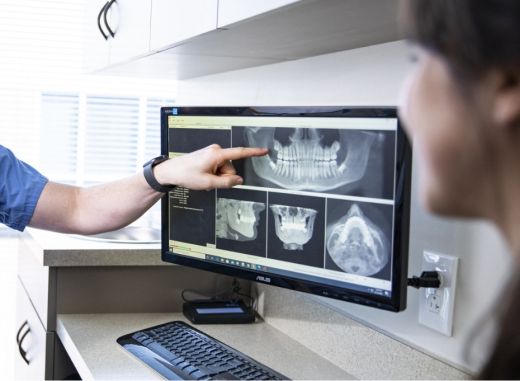
What Are Wisdom Teeth and Why Do They Need to Be Removed?
Wisdom teeth are a set of upper and lower third molars that typically come through when someone reaches their teen years—usually starting around 17 years of age. For some people, their wisdom teeth come in with plenty of space and are properly aligned. However, around 80% of young adults experience problems with their wisdom teeth. This can lead to impaction, meaning they remain trapped under the gums, and can cause several health concerns, including:
- Abscesses and other infections
- Periodontal disease
- Cavities
- Damage to adjacent teeth
- Crowding of the surrounding teeth
- Cyst or tumor development
Evaluation
The first step in having your wisdom teeth removed is a discussion with your oral and maxillofacial surgeon. This typically involves a physical exam and/or an X-ray. They will chat with you about a recommended treatment plan, ask about your medical history, and answer any questions you might have. Oral and maxillofacial surgeons are skilled at advanced extraction techniques and highly trained in safely administering sedatives, such as anesthesia. They can offer you fully thought-out treatment plans that fit your needs.
Procedure
The typical wisdom tooth extraction takes around 60 minutes depending on the number of teeth you need removed, how complex the surgery is, and your overall treatment plan. However, you can expect to be in the office for about 90 minutes to two hours. It’s very important to remember not to drink or eat anything for up to eight hours before your surgery as it can complicate any local anesthesia, nitrous oxide, or IV sedation that may be used. Ask your surgeon about your options, including non-opioid Exparel, which can help reduce any discomfort you feel after the extraction.
Post-Surgery
Immediately following the surgery, you’ll feel groggy, light-headed, or even sleepy, so having a safe ride home is a must. Wisdom tooth extraction can affect patients differently depending on the complexity of the surgery. It’s important to understand what you can expect in the days, and weeks to follow.
24 Hours After Surgery
As your anesthesia continues to wear off, you might notice some pain or discomfort during this time. It’s also common to experience bruising or swelling in the area. You might be prescribed some sort of pain management medication. Remember to ask your surgeon beforehand about any side effects and responsible dosing. You can also start eating around this time. But you’ll need to stick to liquids and soft foods, such as broth or Jell-O. Remember to avoid straws, brushing your teeth, or spitting, as these can dislodge the blood clot covering the socket, otherwise known as a dry socket.
One Week After Surgery
Any symptoms of discomfort or soreness should peak around day three and begin to wear off after day seven. It’s around this time that you can return to strenuous activities, such as group sports or working out. You can also start brushing the extraction site but remember to be gentle!
One Month After Surgery
By the end of the first month, you should be back to your normally scheduled routine. And while the extraction site might look a little strange, you can safely brush and floss the area. Like all health concerns, it’s better to get ahead of the issue before there’s a problem. Talk to your physician before you experience any negative side effects to determine if you will need wisdom teeth extraction in the future. It’s also a good idea to plan the surgery since significant recovery time from school or work can be required. Schedule an evaluation with one of certified oral and maxillofacial surgeons.
Back




